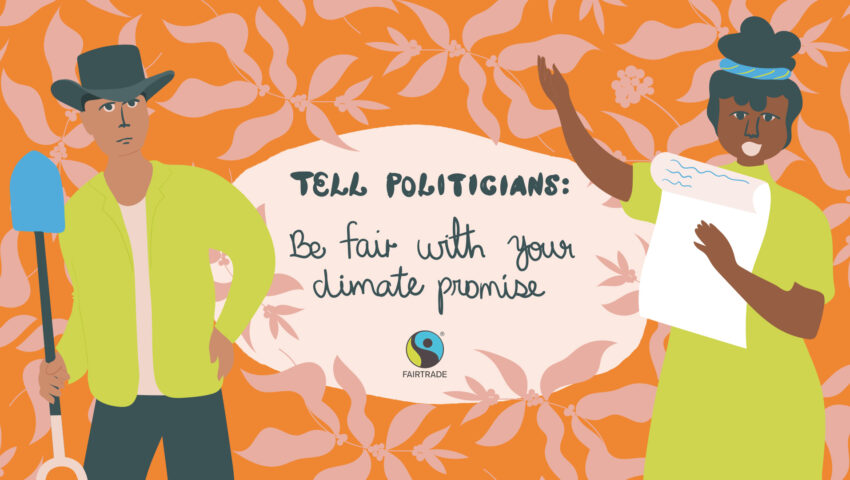Blogs
Fairtrade and the climate crisis

Here at bartlett mitchell we are focused on having a sustainable approach to business and ensuring our activities, as a business, show what sustainable leadership looks like. Part of our sustainability work is providing Fairtrade products, such as our amazing Perkee Coffee to our clients and customers. We also recently signed Fairtrade’s COP26 business pledge, to support Fairtrade farmers and workers in their call for climate justice in the run-up to the COP26 climate summit in Glasgow, UK.
How is Fairtrade working to fight the climate crisis? We invited Eleanor Deans from The Fairtrade Foundation to give us an update
The climate crisis for Fairtrade producers
Fairtrade have released, ahead of the 2021 United Nations Climate Change Conference, also known as COP26, a report titled Fairtrade and Climate Change. This was conducted by researchers from The Vrije University, Amsterdam and Bern University of Applied Sciences. It paints a bleak picture of the future for some of the world’s most beloved commodities, including bananas, coffee, and cocoa, and explicitly identifies how climate change will impact specific crops and regions in different ways.
The study, which was supported by funding from the European Union, suggests that millions of farmers could be at risk of financial collapse as their livelihoods come under increasing climate pressure.
Our current Fairtrade campaign is highlighting just how much is at stake for farmers and workers who produce much of the food we love to consume, and who live with the harmful reality of the climate emergency. In Africa, for instance, temperatures are rising more rapidly than the global average, with extreme weather events and more frequent rainfall now expected across the continent, jeopardising the viability of crops. By 2050, up to half the world’s land that’s currently used to farm coffee may not be viable.
The world’s wealthiest people caused the climate crisis – 50 percent of global emissions are the responsibility of the highest-earning 10 percent. Millions of the people most affected by the climate crisis cannot earn a living income from their hard work. But it’s the communities our Fairtrade movement exists to support who are facing the worst realities of climate change right now.
Living with the reality of the climate crisis every day, Fairtrade producers recognise the urgent need for global change if their livelihoods are to survive. While they cannot earn enough for their daily essentials, they cannot invest in adapting to crises, like the climate emergency or unexpected catastrophes such as the Covid-19 pandemic.
Increasingly unpredictable and extreme weather is forcing farmers and workers, often already on scandalously low incomes due to deeply unfair global trade, into serious hardship. It is not possible to effectively tackle the climate crisis, without climate justice for farmers.
bartlett mitchell supports 1.8 Million Farmers Calling for Climate Justice
bartlett mitchell, alongside other businesses such as Ben & Jerry’s, Tony’s Chocolonely, and UK retailers Co-op, M&S and Waitrose, have signed a business pledge urging world governments and leaders to listen to the voices of farmers, as they call for urgent action at COP26.
In the pledge, developed by Fairtrade as part of its Be Fair With Your Climate Promise campaign, the companies commit to take accountability for their own climate impact. They also commit to work alongside Fairtrade to protect and invest in the resilience and green transition of global food supply chains in the face of the climate crisis.
As companies sourcing from Fairtrade producers in Africa, Asia, Latin America and the Caribbean, the signatories to the pledge see the climate crisis hitting the people in their supply chains disproportionately hard. Increasingly volatile weather is damaging crops, harming livelihoods for farming communities, and making crop production more unpredictable.
Together, all the signatories commit to four key areas of action as part of their ongoing work in their international supply chains, and they call on other businesses to do likewise:
- To pay fair prices to producers – farmers and workers should not have to choose between tackling poverty and building resilience to the climate crisis. ‘Our Fairtrade commitments are critical to achieving this,’ say the companies.
- To be long term partners with farming communities, listening to the experience of farmers, sharing their own expertise and investing in the urgent transitions farmers need. They will back a shift in food production and supply to one that is resilient to the changing climate, including backing nature-based solutions. They will support farmers as they work together to cut the emissions embedded throughout their supply chains.
- To “know and show” their climate impact, by measuring carbon emissions embedded in their supply chains, assessing the climate risks faced at farm level, and publishing the results. The companies say they want to raise awareness about the challenges and the practical solutions, setting a high bar for other businesses.
- To speak out, calling in public and private for Governments to set and deliver ambitious targets for emissions reduction and climate finance which puts farmers and agricultural workers first.
The business pledge follows the publication of an open letter from 1.8 million Fairtrade farmers and workers across Africa, Asia, Latin America and the Caribbean earlier this week. The letter warns governments that their lack of action is threatening farmers’ livelihoods and global food supplies, and deepening poverty. Furthermore, the letter calls out the broken promises from world leaders. It demands that the promised $100 billion climate finance is not only paid, but that those funds reach farmers and workers directly to ensure they can withstand the growing challenges of climate change, including by planting more trees and investing in more resilient crops.
For more information about Fairtrade’s Be Fair With Your Climate Promise campaign visit: www.fairtrade.org.uk/be-fair
Eleanor Deans
Partnership Manager
Fairtrade





